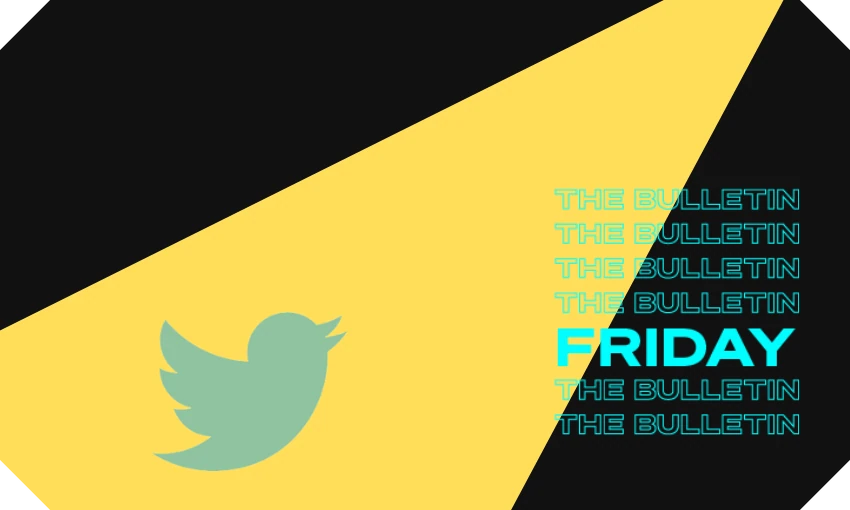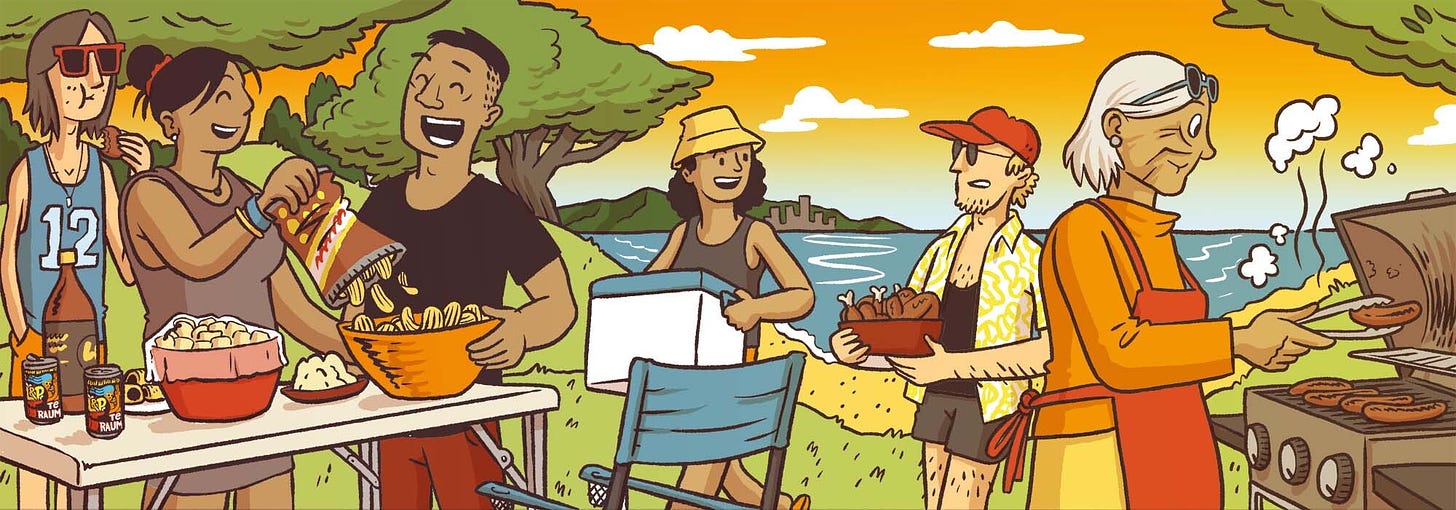Tech company canary whistling a bad tune
Meta's revenue is down, Twitter may be Elon Musk's today, Apple and Microsoft predict a slow down. It doesn't bode well economically and suggests something is a bit rotten in the state of social media
Mōrena and welcome to The Bulletin for Friday, October 28, by Anna Rawhiti-Connell. Presented in partnership with Z Energy.
In today’s edition: school-aged children under SIS investigation; government wants more big TV shows shot here; the efficacy of our environmental spending; but first, bad news all round from the big tech companies seen as warning sign
Elon Musk may own Twitter by end of the day as major tech company growth slows or declines
Musk may own Twitter today
In the next 12 hours, Elon Musk may own Twitter. He walked into Twitter HQ with an actual sink yesterday (it’s a meme thing). Twitter rarely turns a profit but if the deal goes through today (who knows!), the company won’t have to withstand the glare of public reporting. Commentators are calmly predicting the platform's decline and worrying about what journalists will do without it. Musk’s potential gutting of staff and promises to “restore free speech” (read: less content moderation), do not offer a good prognosis for democracy or online wellbeing. That’s cause for concern everywhere including New Zealand and may present challenges for any localised attempts at content regulation and research. Twitter has previously been a very cooperative partner on the Christchurch Call.
Bad news for Google, Amazon, Apple, Meta and Uber
As I am sure you’ve gathered, dark clouds loom on the economic horizon. ANZ CEO Antonia Watson cited them in her comments on the bank’s $2.3b profit yesterday. The US GDP announcement this morning showed growth but commentators are still pretty gloomy. Bloomberg ran a piece headlined Tech Is ‘Canary in Coal Mine’ yesterday. The New York Times has a very good summary of the bad financial news for Google, Amazon, Snap, Apple, Meta and Uber. It also touches on some existential issues: “The big tech companies haven’t really found a new, very profitable idea in years.” Microsoft reported the lowest growth in five years on Tuesday prompting a “Microsoft is the canary in the economic coal mine” headline.
Trade and technology restrictions in China exacerbating slowdown
The Meta news yesterday grabbed headlines because of billions of dollars of losses on its investment in the metaverse but it's the Microsoft news that has people really worried. Microsoft is considered fairly reliable. Apple would also be in this category. The New York Times article mentions the growing threat of trade and technology restrictions in China as an exacerbator of tech company woes. Noah Smith published a dramatically titled piece this week called The end of the system of the world. It’s a big look at geopolitics and trade over the last few decades, and the decoupling of China from America. Smith uses Apple as an example of a company rapidly decoupling. I recommend reading but grab a snack for sustenance.
Reserve Bank governor warns of fragmentation in trade and policy consensus
Very sorry to leave you with that big system-shaking read on a Friday but it chimes with comments from Reserve Bank governor Adrian Orr yesterday about “a fragmentation of global trade and policy consensus". BusinessDesk’s Pattrick Smellie also hit on it this week in his column (paywalled) about the death of free trade where he mentions the “now-closing era of hyper-globalisation”. Smellie, as always, has some optimism, writing that what’s happening may “spur, at last, the focus required to compete internationally on the quality of our thinking rather than the quality of our cows.”
Kia pai te raumati!
As the days get longer and the sun gets higher, summer is truly right around the corner. To celebrate both the return of raumati and the launch of L&P’s brand new te reo Māori summer can, The Spinoff’s Alice Webb-Liddall and Toby Morris have created a beautiful (and useful) guide to incorporating tikanga and te reo Māori in your sunny-season adventures. Whether you’ll be spending summer at the beach, in the forest or just connecting with the cousins over kirihimete kai, it’s the perfect piece to get you in the mood. Read it here, and kia pai te raumati! (sponsored)
School-aged children under investigation by SIS
A report from Stuff’s Michelle Duff this morning reveals that the Security Intelligence Service (SIS) has school-aged children under investigation. SIS Director-general Rebecca Kitteridge says it’s still a small minority of the people of interest that they are investigating, but “it’s a concern that this is happening at all.” There’s increasing concern about younger people heading down online rabbit holes and accessing extremist and violent content, a trend that’s been observed in other countries. The SIS released its first ever public guidelines to identifying violent extremists yesterday, based on a recommendation from the Royal Commission of Inquiry into the terrorist attacks in Christchurch.
More big TV series shot in New Zealand on government wishlist
BusinessDesk’s Jem Traylen reports (paywalled) on the quiet-ish release of the government's proposed changes to its screen production grant. Nothing nefarious implied here - it just didn't get a lot of pick up yesterday. In 2021, international productions received $169.8m in funding from the New Zealand screen production grant. New Zealand productions received $48.4m (New Zealand productions also received $301.6m in 2021 from other government sources). Screen-sector revenue in New Zealand is estimated to be $3.5b each year so we’re not talking chump change here. The changes are aimed at attracting more international multi-year television productions rather than one-off blockbuster movies. The proposal is now out for consultation.
Journalism is an essential part of society and shouldn’t be a privilege of those who can afford it. The support of readers like yourself helps to ensure The Spinoff remains freely accessible to all, regardless of their ability to pay. If you value what we do and have the means to do so, please make a donation today.
How effective is our environmental spending?
Aotearoa’s Government spends $2b a year on the environment, but where does that money go? Backed by his recently published report on our tracking of emissions, Parliamentary Commissioner for the Environment Simon Upton dives into discussion with Bernard Hickey on the importance of collective clarity and knowledge in the measurement of our environmental spending in the latest epsidoe of When the Facts Change.
Click and collect
Follow up to yesterday’s Iran item - government denies influencers affected Iran criticism, passes motion condemning actions against protesters in Iran and calls for investigation
Abuse in Care Inquiry commissioner resigns, will not be replaced
New Covid infections jump by 1500 in 24-hour period (Ministry of Health still reporting weekly but daily case numbers are available - RNZ is still tracking)
HPV vaccination rates “plummeted” during the pandemic
Rebecca Macfie writes a tribute to union leader Helen Kelly following the passing of the Fair Pay Agreements bill
Got some feedback about The Bulletin, or anything in the news? Get in touch with me at thebulletin@thespinoff.co.nz.
If you liked what you read today, share The Bulletin with friends, family and colleagues.
The leader of the opposition would like you to know he is a normal bloke. Mad Chapman details Christopher Luxon's social media transition to everyman mode a year out from the next election. Hayden Donnell reports that AT executives seem to be taking the new mayor's missives on board. Suraya Sidhu Singh lists 10 popular myths about passenger rail in Aotearoa (and why they're all rubbish). Max Rashbrooke looks at how two recent court cases highlighted the inadequacies of New Zealand’s political donation laws. Anjum Rahman says the social cohesion framework should be applied to government first. Dylan Cleaver considers the decision made by principals this week to can live broadcasts of Auckland high school rugby from next season.
Super Sports Friday
Still plenty of fallout from the New Zealand Rugby scheduling bungle. Stuff’s senior rugby writerMarc Hinton called it “shocking optics and an inexcusable failing”. Moving on, as instructed by the coaches of both teams, the Blacks Ferns and the All Blacks named teams for their respective games on Saturday night. Both have wished each other good luck with All Blacks coach Ian Foster sending the Black Ferns a video message from Japan. The Black Caps play Sri Lanka in the team’s next round at the T20 world cup. Their last game against Afghanistan was rained out and so they’re naturally preoccupied with weather forecasting. If none of that is your cup of tea, here’s an early preview of nude bike race happening next month in the Coromandel. Also recommend this from The Detail on sports sponsorship and the athlete voice in the wake of what’s happened with Netball Australia.
It’s Friday so…
Look, a man died and it’s not funny but Stuff coupled the story of Amou Haji or Uncle Haji dying (billed as “the world’s dirtiest man” - perhaps unkind, but probably true) with an explainer on how often you should wash. They did join the dots with the expert they spoke to. Jeroen Douwes, a professor of public health at Massey University, clarified he didn’t think Haji, who was 94, died because of the bath he had several months before his death. Good to get that cleaned up before the weekend. For the record, Haji didn’t wash for six decades, fearing he would get sick if he ever used "soap and water" citing "emotional setbacks in his youth" as a primary reason for not bathing.











>> Musk’s potential gutting of staff and promises to “restore free speech” (read: less content moderation), do not offer a good prognosis for democracy or online wellbeing.<<
It is funny how you understand democracy. Democracy is when people can freely express their views and opinions, without fear of persecution or ousting. If you suppress free speech to avoid people being offended by other views or rethink their own ones, then you are technically promoting totalitarianism. Totalitarianism is defined by only state sanctioned opinions are allowed to be expressed. And if you make corporations doing the dirty censorship work for you, when you mingle state and corporations, you end up in a fascist system.
Lets see if you are democratic enough to let my comment pass your moderation :)